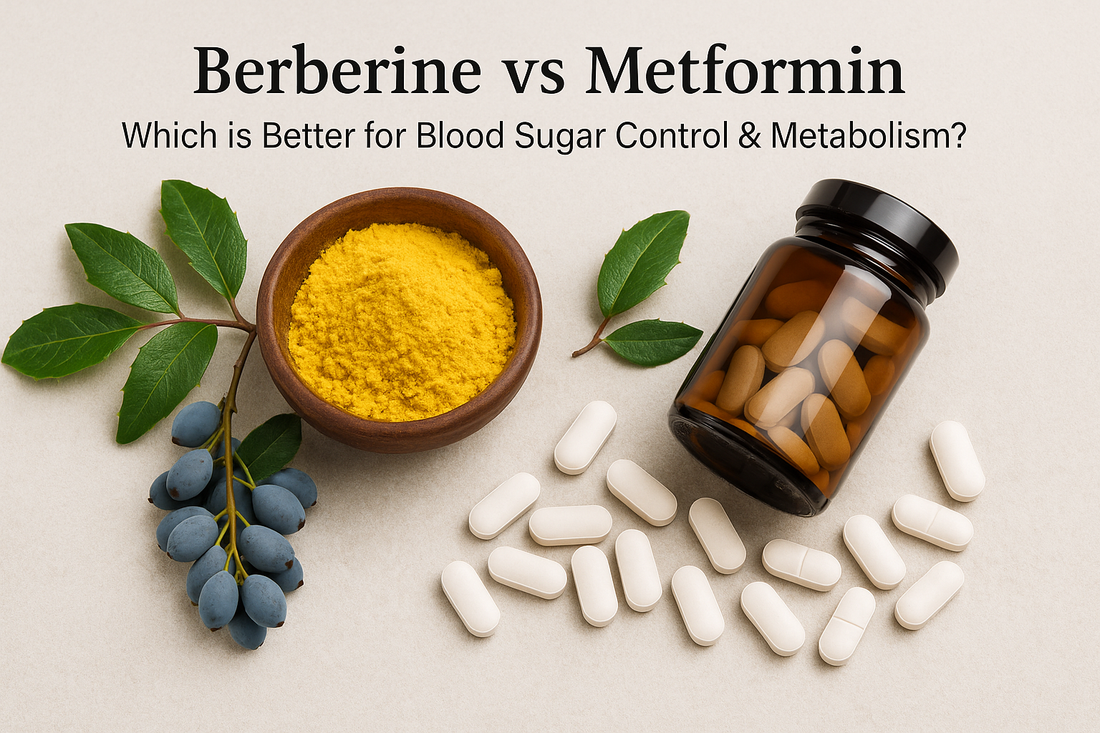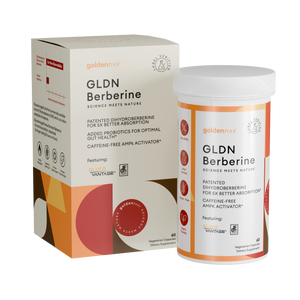Why This Comparison Matters?
Managing blood sugar and supporting metabolic health are top priorities for many people today. While Metformin remains one of the most prescribed medications for type 2 diabetes, Berberine has emerged as a clinically studied natural compound that shows similar metabolic benefits.
At GLDN Root, we’ve seen growing interest in berberine supplements among those focused on holistic metabolic health.
In this article will explore how each works, what science shows, and when they may be appropriate.
Understanding the Basics: What Are Berberine and Metformin?
Berberine
Berberine is a bioactive(biologically active) compound found in plants like barberry and goldenseal. It’s been used for centuries in traditional medicine and is gaining attention for modern metabolic support.
-
Mechanism: Activates AMP-activated protein kinase (AMPk), the body’s “metabolic switch” that regulates fat and glucose metabolism.
-
Evidence-backed benefits: Improves insulin sensitivity, helps regulate blood sugar, and supports fat metabolism.
Metformin
Metformin is a prescription medication widely used for type 2 diabetes management.
-
Mechanism: Lowers glucose production in the liver and increases insulin sensitivity.
- Benefits: Effectively manages blood sugar, but may cause GI discomfort, vitamin B12 depletion, or fatigue.
Mechanism of Action: How Each Regulates Blood Sugar
|
Function |
Berberine |
Metformin |
|
Primary Action |
Activates AMPK pathway to regulate metabolism |
Decreases liver glucose output |
|
Effect on Insulin |
Improves insulin sensitivity |
Improves insulin sensitivity |
|
Additional Benefits |
May support lipid metabolism & fat burning |
Primarily focused on glucose |
|
Side Effects |
Mild GI upset (less common with high-quality supplements) |
Common GI side effects (nausea, bloating) |
Callout: Research shows berberine can reduce fasting blood glucose and HbA1c levels with comparable efficacy to metformin in several clinical trials.
What the Research Says (Science-Backed Insights)
Clinical studies provide valuable insights:
-
A 2008 trial found berberine (500 mg, 3x daily) produced similar improvements in HbA1c and fasting glucose as metformin (1,500 mg daily).
-
Small-scale studies indicate enhanced weight and lipid profile outcomes with berberine supplementation.
-
While metformin is FDA-approved, berberine’s clinical evidence continues to grow, particularly for pre-diabetes and metabolic syndrome.
Note: Always consult a healthcare provider before making changes to medication or adding supplements.
Read more: Combining Berberine with Probiotics: A Powerful Duo for Gut and Metabolic Health
Safety, Side Effects, and Interactions
-
Metformin: Common side effects include nausea, bloating, diarrhea, and occasionally vitamin B12 deficiency.
-
Berberine: Mild GI upset, constipation, or diarrhea are possible, usually dose-dependent.
Berberine is generally safe at clinical doses (500-1,000 mg/day). It may interact with other blood sugar-lowering medications, so consultation is important.
GLDN Root Berberine is formulated for optimal absorption and gentle digestion, making it a reliable option for those seeking natural support.
Weight Management & Metabolic Health
Both compounds can support healthy weight management:
-
Metformin: Reduces appetite via improved insulin sensitivity.
-
Berberine: Boosts AMPK activity, encouraging fat oxidation and energy balance.
Some users combine GLP-1 therapies with berberine for comprehensive metabolic support. Maintaining AMPk activity is also linked to better energy levels and long-term metabolic health, particularly as we age.
Choosing Between Berberine and Metformin
-
Diabetic & prescribed Metformin: Stick with your medication, but discuss natural support with your provider.
-
Metabolic balance, pre-diabetes, insulin sensitivity: Berberine may be a safe, natural approach.
Decision Guide:
Prefer natural supplements → Berberine
Doctor-prescribed medication → Metformin
Seeking synergy → Berberine alongside lifestyle and medical guidance
Read more: Why Berberine Is the Ideal Supplement Post-GLP-1 Weight Loss Treatment
How to Choose a High-Quality Berberine Supplement
Look for supplements that ensure purity, dosage, and absorption.
GLDN Root Berberine Highlights:
-
Clinically effective dose: 1,200 mg/day
-
Includes bioavailability-enhancing compounds
-
Made in the USA under GMP standards
Key Takeaways
-
Both metformin and berberine improve blood sugar and insulin sensitivity.
-
Berberine offers a natural, multi-benefit alternative with fewer side effects.
-
Clinical data continues to strengthen its position as a metabolic health powerhouse.
Always consult a professional, especially if already taking prescription medication.
References:
- https://www.metabolismjournal.com/article/S0026-0495%2808%2900046-2/abstract
- https://www.sciencedirect.com/science/article/pii/S0753332223005437
- https://drruscio.com/berberine-vs-metformin/



